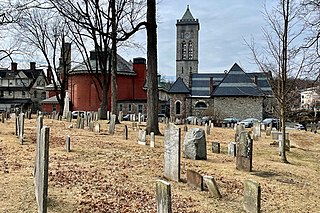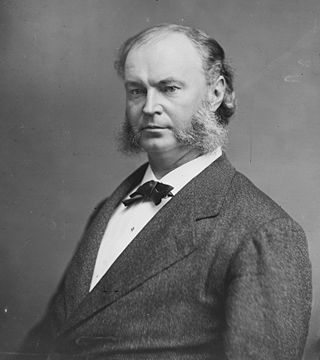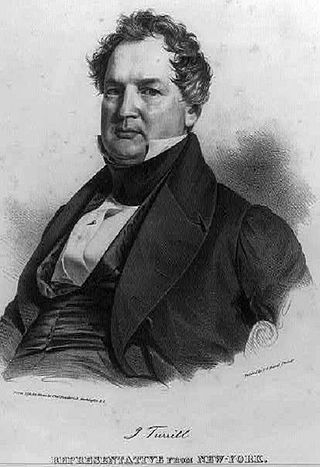Related Research Articles

Morristown is a town and the county seat of Morris County, in the U.S. state of New Jersey. Morristown has been called "the military capital of the American Revolution" because of its strategic role in the war for independence from Great Britain. Morristown's history is visible in a variety of locations that collectively make up Morristown National Historical Park, the country's first National Historical Park.

Theodore Frelinghuysen was an American politician who represented New Jersey in the United States Senate. He was the Whig vice presidential nominee in the election of 1844, running on a ticket with Henry Clay.
Silas Condict was an American farmer, prominent surveyor, and large landowner from Morris County, New Jersey. He served as a New Jersey delegate to the Continental Congress from 1781 to 1783. Later, he served a number of terms in the State Assembly, and was its Speaker in 1792-1794 and in 1797. His name can be found in archived Congressional records @ " A Biographical Congressional Directory, 1774-1903" @ page 467, found at Google books and at Archive.org. It is found here also:, one of many Congressional Archive sources showing the Condict family.

Mount Pleasant Cemetery is a historic rural cemetery in the North Ward of Newark in Essex County, New Jersey, United States. It is located on the west bank of the Passaic River in Newark's Broadway neighborhood, opposite Kearny. It occupies approximately 40 acres and was designed by Horace Baldwin. The cemetery is listed on both the New Jersey Register and the National Register of Historic Places.

John Kean was an American attorney, banker and Republican Party politician from Elizabeth, New Jersey. He represented New Jersey in the U.S. Senate from 1899 to 1911 and served two separate terms in the United States House of Representatives, from 1883 to 1885, and from 1887 to 1889. A member of the Kean family of politicians, his great-grandfather, John Kean, had been a delegate to the Continental Congress for South Carolina, his brother was U.S. Senator Hamilton Fish Kean, his nephew was U.S. Representative Robert Kean and his great-nephew was Governor Thomas Kean.

The 45th United States Congress was a meeting of the legislative branch of the United States federal government, consisting of the United States Senate and the United States House of Representatives. It met in Washington, D.C. from March 4, 1877, to March 4, 1879, during the first two years of Rutherford Hayes's presidency. The apportionment of seats in the House of Representatives was based on the 1870 United States census. The Senate had a Republican majority, and the House had a Democratic majority.

The First Presbyterian Church Cemetery is a historic churchyard cemetery of the First Presbyterian Church in Morristown, New Jersey, United States. The cemetery was added to the National Register of Historic Places, listed as a contributing property to the Morristown District, on October 30, 1973.

Theodore Fitz Randolph was an American attorney, businessman, and politician who served as the 22nd governor of New Jersey from 1869 to 1872 and represented the state in the United States Senate from 1875 to 1881. He was the son of U.S. Representative James F. Randolph.
Dudley Chase was a U.S. Senator from Vermont who served from 1813 to 1817 and again from 1825 to 1831. He was born in Cornish, New Hampshire.
Maplewood Cemetery is a cemetery in Freehold Township, in Monmouth County, New Jersey. It was established in the late 1800s.

George Vail was an American Democratic Party politician who represented New Jersey's 4th congressional district in the United States House of Representatives from 1853 to 1857. His father Stephen Vail, and his brother Alfred Vail were the driving force behind the success of the Speedwell Iron Works. Father and sons assisted in the technical expertise and financial development of this family business. The Vail family contributions to mechanical inventions, early communication, transportation industry, and mass production placed Speedwell at the cutting edge of the Industrial Revolution in the United States.

Augustus William Cutler was a 19th-century politician and lawyer from New Jersey. The great-grandson of Silas Condict, he served two terms in the United States House of Representatives from 1875 to 1879.

George Augustus Bicknell was an American lawyer and politician who served two terms as a U.S. Representative from Indiana from 1877 to 1881.

Joel Turrill was a judge, politician, and diplomat from New York. From 1833 to 1837, he served two terms in the U.S. House of Representatives.
Jonas Phillips Phoenix was a U.S. Representative from New York.

Joshua S. Salmon was an American Democratic Party politician who represented New Jersey's 4th congressional district from 1899 to 1902.

Augustus Albert Hardenbergh was an American Democratic Party politician who represented New Jersey's 7th congressional district in the United States House of Representatives from 1875 to 1879, and again from 1881 to 1883.

George Thomas Cobb was an American Democratic Party politician who represented New Jersey's 4th congressional district for one term from 1861 to 1863.
James Fitz Randolph was a United States representative from New Jersey. He was also the father of Theodore Fitz Randolph. Born in Middlesex County, New Jersey, he received a limited schooling.
Joseph Fitz Randolph was an American Whig Party politician who represented New Jersey in the United States House of Representatives from 1837 to 1843 as part of a general ticket covering the entire state.
References
- ↑ "Funeral services will be held Tuesday for Frank D. Abell". Trenton Evening Times . November 23, 1964.
- ↑ George T. Cobb Biographical Directory of the United States Congress. Accessed August 18, 2007.
- ↑ Augustus William Cutler Biographical Directory of the United States Congress. Accessed August 18, 2007.
- ↑ Theodore Fitz Randolph Biographical Directory of the United States Congress. Accessed August 18, 2007.